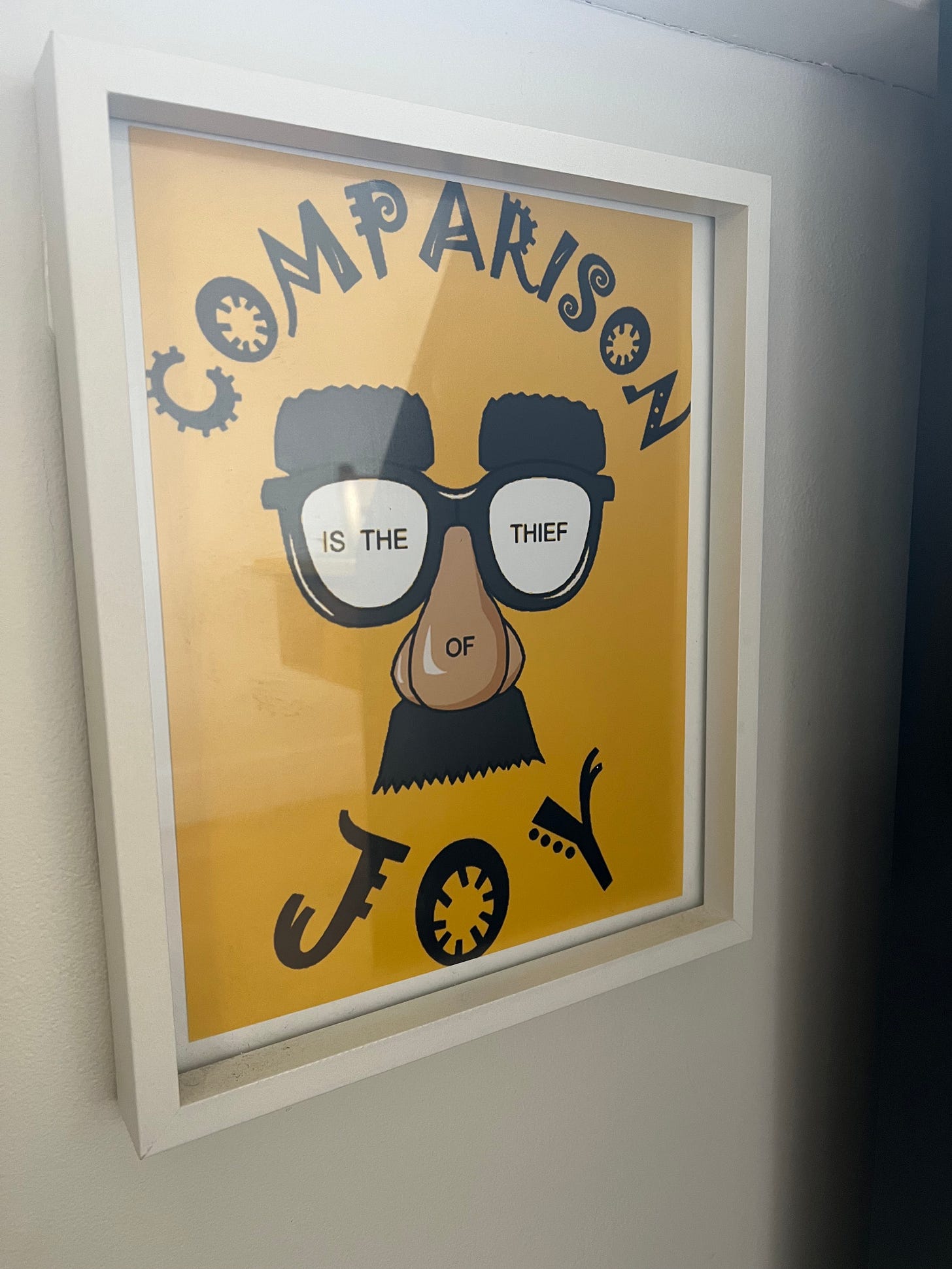You know, wanting to be noticed, admired, sought after, but somehow never quite being the pick of the bunch 💐 and wondering what ‘they’ have that you don’t?
What?!
I’m not alone?
NO WAY!
This self-centredness (ouch) comes from a wounded place of feeling like I don’t matter. I mean, I ‘know’ I matter, people love me, I love people blah blah blah, but my little hyper vigilant antennae never got that memo. Turns out, if I’m not vigilant about THEM, they can be in the driving seat. They can tell me:
‘Well, yeah sure you matter, but the way in which you matter… doesn’t matter.
You don’t matter as much as your friend who just published a best selling book/the therapist friend who has a 6 month waiting list/the school mum who just ran a marathon/Brené/Oprah/God’.
See. It’s weirdly self centred, whilst also making you feel pants.
Ahhhhh, yes my little dandelions and daisies, this week at ✨permission to feel✨ we’re looking at how the seeds of comparison get sown. Of course, comparison itself isn’t a feeling, but boy can it bring up a whole bunch!
Do I have it nailed?
Am I, as Viv Groskop calls it, living in a state of ‘happy high status’?
Nooooo. No No No.
There’s a reason I have this up in my office:
Because, you beautiful blooms, comparison is a part of the human condition. We all do it.
What does this look like? Well I think Brené Brown sums it up perfectly:
Comparison is the crush of conformity from one side and competition from the other - it’s trying to simultaneously fit in and stand out.
Why do we compare?
According to the Social Comparison Theory developed by Leon Festinger we learn how to define ourselves by comparing ourselves with those around us.
In this theory he makes a very pertinent point.
When we compare, all our comparisons are subjective. It’s based upon our own world view.
There can be no objective benchmark against which we can make comparisons.
In other words, they are not to be taken too seriously. Or at least, if you do take your comparisons seriously do it knowing that that is not how the rest of the world sees you.
Often, rather than comparing ourselves with someone who is similar, we either make upward comparisons (comparing ourselves to someone we believe to be better than us) or downward comparisons (comparing ourselves to someone we believe to be worse than us).
With its algorithms, this makes social media a particularly precarious place. If we spend more time looking at people against whom we compare ourselves negatively, then we will be presented with more and more similar feeds. This will help to exacerbate any ‘not good enough’ vibes we may have going on. Alternatively, it can encourage our narcissistic tendencies if we spend more time looking at those we see as worse off than us in some way.
So how can we pull ourselves out of the comparison trap and regain our own sense of self?
What can you do when you catch yourself comparing yourself negatively?
Ask yourself a couple of questions:
Question 1
Is there something I can do about it?
If there is, what and whose help do you need to engage? It may not be obvious at first that there is something you can do about it, but get curious and see. Then ask yourself question 2.
If there is nothing you can do about it then let it goooo. Let it goooooooooo. There may be some teeth gnashing and tears before you actually properly let it go. This is normal, to be expected, even.
Question 2
Do I care enough to do what I can about it?
This will probably mean that you will have to examine what sacrifices you need to make in order to achieve that goal.
Then it’s a matter drawing up a plan and sticking to it.
Remember, it is in all our experiences to be disappointed and to sometimes feel like the weed in the poem. As Jacob Bronowski who wrote ‘Ascent of Man’ said,
‘The world is made of people who never quite get into the first team and who just miss the prizes at the flower show.’
Interesting choice of words. Not ‘full’ of people, ‘made’ of people. ‘Weeds’ are the makers; they do not win the flower show, but they bring nutrients and water from deep in the soil; they prevent soil erosion, they increase organic matter; they fix nutritional imbalances and provide homes for loads of microbes and animals. Pretty darned important really. They matter, even if they don’t ‘win’ best bloom. They matter in the fabric of life and the living.
But what if your comparison goes beyond the typical human condition? What if it makes you write poems about weeds and flowers? What if it skips along the merry road of life with perfectionism? What then?
If this is the case, I’d invite you to reflect on where you are putting your value and why.
Maybe the value you are putting on something is not actually what you value, but a projected value from someone else.
Now we are talking about comparison that is driven by perfectionism. It is my opinion that perfectionism is born out of the core belief, ‘If I criticise myself enough and aim to answer all those criticisms, then I will be prepared for any criticism that comes my way.’
It is the opposite of self compassion, in other words its roots are in toxic shame.
I think that self compassion is not something that we naturally have, but is something that we learn as compassion is modelled to us by those who take care of us. If we are told that we are too sensitive or think too much or we need to ‘man up’, how on earth are we to garner a modicum of grace and compassion for ourselves, and then for others?
Children need to be told, ‘Hey, that happens’, ‘I believe in you’, ‘You can handle it and if you’re struggling, let me know what help you need.’
Any child needs their feelings to be validated by their parents or caregivers in order to feel like they are ok and the world is a safe place to ask for help.
When that doesn’t happen children adapt their behaviour in order to try and gain those very assurances. Even if they are never likely to receive them because their parents aren’t capable of giving them.
When we live like this, we view ourselves through a prism of other people’s opinions and criticisms. We are left with a fractured sense of self, just a reflection of what we think we need to be in order to be accepted, to belong. So we grow our little invisible comparison antennae. Also known as codependency.
Finally, incessant comparison is also encouraged by our capitalist Western society which manipulates our tendency to compare for economic gain and oppressive means. Rather than going into a whole diatribe against the capitalist society in which we live, I’d rather leave you with a vision of what we can live towards instead.
I’d love to point you in the direction of Jaiya John who is a most beautiful writer. He writes about the difference between productivity and fruitfulness. Whilst, from early childhood we have been conditioned to be productive, a regenerative world is one which can ‘create social fertility and inspire transformation in their community.’
A bit like a weed…
That’s it for this week. Phew, feels like quite a full one. Let me know what you think and what resonated and if you feel prompted to write a poem based on the idea of comparison I’d love to read it!
Thank you, thank you, thank you for subscribing. Writing this each week is one of my favourite times of the week. I hope you enjoy reading it as much as I enjoy writing it.
That’s it for now, ‘til next time!







Share this post